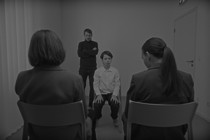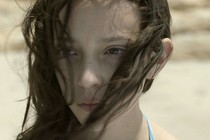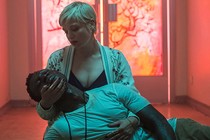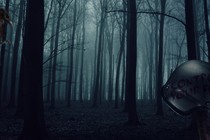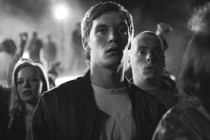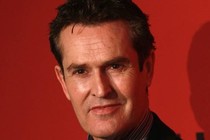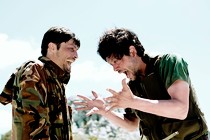Shahada, ou comment trouver sa voie
par Bénédicte Prot
Burhan Qurbani a impressionné le public berlinois, non seulement pour avoir été choisi en compétition avec son film de fin d'études (pour l'Académie allemande de cinéma et de télévision DFFA), mais parce que ce premier long métrage témoigne d'une virtuosité narrative et d'une inventivité visuelle peu commune, en plus d'offrir une fenêtre différente sur un monde méconnu, la communauté musulmane allemande, avec une humanité universelle.
Malgré son titre, Shahada [+lire aussi :
bande-annonce
fiche film], qui désigne la profession de foi des musulmans ("Allah est le seul dieu et Mahomet est son prophète"), c'est bien un film allemand que nous livre le réalisateur d'origine afghane : "une partie de nous n'est pas restée ailleurs, nous sommes allemands", a précisé l'actrice Maryam Zaree pendant la conférence de presse à propos de la communauté musulmane locale, qui n'est d'ailleurs pas uniquement composée de Turcs ou d'Arabes, mais aussi d'Africains ou même de blancs comme les Bosniaques et les Croates (une diversité bien échantillonnée parmi les acteurs du film, car "l'Islam n'a pas qu'un seul visage", précise le réalisateur). C'est la première chose que Qurbani parvient à faire avec son film : aller "contre les stéréotypes" et montrer des individus intégrés qui ont chacun un rapport plus ou moins fort avec leur religion, en somme des musulmans tolérants qui représentent selon lui "99% des cas".
Il le fait à travers un récit organisé en cinq chapitres (reflétant les cinq piliers du Coran) qui enchevêtre dès l'entrée en matière, en une nuit tragique, les histoires de plusieurs personnages en crise (la fille d'un imam "idéal", tolérant et moderne, qui vit mal le choix qu'elle a fait d'avorter et se réfugie dans un intégrisme qui heurte son père et toute sa paisible communauté ; un homme qui trahit son épouse avec une Bosniaque dont il a tué l'enfant par accident ; un Africain pratiquant qui n'accepte pas ses désirs homosexuels) qu'il pousse à leurs limites à travers des conflits moraux et motifs universels (culpabilité, aveu, punition, amour interdit...), à la différence près qu'ils essaient d'y faire face d'une manière qui corresponde avec leurs convictions : il n'est pas toujours simple pour un musulman qui adopte un style de vie occidental de le faire tout en restant un "bon musulman", précise Qurbani. Shahada raconte la recherche de la bonne voie, qui doit pour le réalisateur passer par un dialogue séculaire avec la religion et avec soi-même – une casuistique en somme.
Si le film évoque à travers sa galerie de personnages et d'attitudes plusieurs étreintes interdites, c'est-à-dire des amours contrariés, c'est finalement parce que tout, le Coran comme l'humanité en général, a pour fin l'amour du prochain (compassion et tendresse sont très présents dans le film). Ce film qui fait une belle utilisation des éléments (eau et sang) aspire à résoudre les conflits par la fluidité et la tolérance.
Vous avez aimé cet article ? Abonnez-vous à notre newsletter et recevez plus d'articles comme celui-ci, directement dans votre boîte mail.













